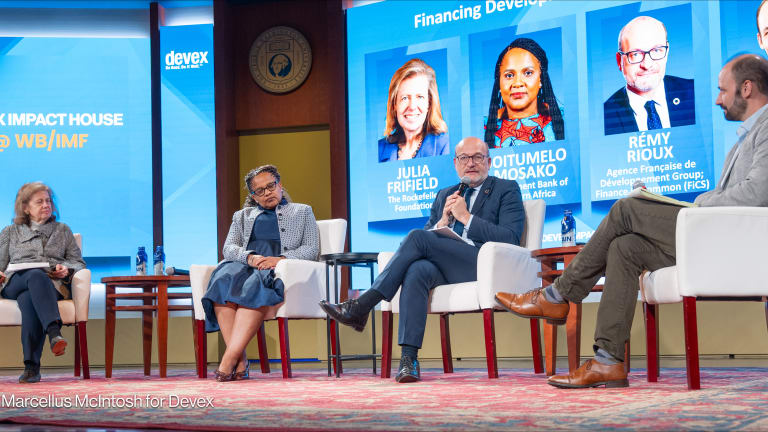
By Todd Moss
The maxim that armies are always fighting the last war might just as aptly apply to development agencies: They are too often tackling yesterday’s problems with an outdated set of tools. But if we want our development policies and agencies to serve our interests, we need them to both live in the present and prepare for the future. So, what might development policy look like, say, a decade from now? What should we be thinking about now to get ready? Here are three big trends I think will be shaping the future of development:
1. Drastically fewer poor countries
The old idea of a binary world of a few rich countries surrounded by lots of poor ones (think G-8 vs. G-77) is simply no longer true. (If you don’t believe me, watch Hans Rosling.) And it’s not just fast-growing India and China, but lots of countries, including many in Africa. In fact, the International Development Association, the World Bank’s soft loan window for poor countries and arguably the most important international development institution, will probably lose at least half of its client countries over the next 10 to 15 years because they will grow too rich to qualify.
2. New players are breaking the traditional aid cartel
The old donor-recipient model dominated by OECD governments is becoming increasingly passé. New donors (China, India, the Gulf, etc.) play by different rules and with different aid models linked to commerce. Big private philanthropists now rival mid-size government donors in both size and influence. The Bill & Melinda Gates Foundation now distributes about $3 billion per year, which would make it the same size as the median OECD donor (or roughly on par with the aid programs of Italy or Australia). Perhaps most decisively, private sources of capital—hedge funds, sovereign wealth funds, and other investment vehicles—are a growing source of accessible capital for poor regions. Private capital flows into Africa hit $55 billion last year, almost double the level of aid flows.
3. The likely end of the Gleneagles “doubling aid” era
Recent British and Australian pledges aside, medium-term prospects for major expansions in public-sector aid dollars are probably dim. Belt-tightening across Europe and North America will instead likely lead to budget shrinkage and hasten the relevance of private and non-OECD actors in this space.
So, what might all this mean for future development policy?
1. Escalating demand for value-for-money
This won’t necessarily mean greater enforcement of selectivity or conditionality in the old sense, but rather I suspect we are still at the early front–end of a wave of new results-based aid innovations. Output-based aid is catching on while outcome-based aid (AKACash on Delivery) will be piloted soon. We are also certainly going to see new and wider applications of cash transfers, partly because these are proving to be highly efficient and partly as a reaction to old aid models that aren’t.
2. Global public goods rather than country programs
With only a few dozen really poor countries left, and still large pockets of poor people in middle-income countries, the big value in aid will be investing in solutions that have impacts beyond a single country’s borders. This means investing more in new vaccines, agricultural technology, clean energy, regional infrastructure, and other things that cannot be done by designing narrow country programs for Mali or Cambodia. (Of course political aid and bribes to allies for strategic reasons will stay in a country silo.)
3. Most importantly, development will shift toward non-aid tools
The debate in the United Kingdom right now about its aid program in India is just a sign of things to come. The British public is asking why its scarce aid dollars might go to a country with $300 billion in reserves and a space program. More to the point, India doesn’t want British aid. It wants business, technology, and visas. And this will be increasingly true for places like Indonesia, Nigeria, Mongolia, Vietnam, and Ghana. For the OECD countries, this suggests that development policy will become about fixing the public policies and tools that we have to encourage trade, investment, migration, and other aspects of global interaction that are typically beyond the purview of aid agencies.
Conclusion: We aren’t ready for this new world yet.
Unfortunately, Western governments haven’t caught up to these emerging trends — and are definitely not set up to deal with these changes. (The U.S. Agency for International Development and IDA were established for a very different world more than 50 years ago… and they are showing their age.) Most budget systems can’t handle results-based aid models very well, most agencies are stuck in a country-based allocation and strategy mode, and no one yet has a credible or efficient way to fund global public goods. Policy coherence (or even the more modest goal of clear articulation of the tradeoffs) is still more a buzzword than reality. And our private-sector tools, like the Overseas Private Investment Corp. in the United States, are woefully underutilized and even under threat.
All of this partly explains why the United States is struggling with reorganization and mistakenly embracing a flawed whole-of-government model. Creating modern institutions with the capability to respond to this new world and its new demands may sound like moving bureaucratic boxes, but is in fact the next frontier of global development policy. Otherwise, function will continue to follow form, and our development agencies and ideas will continue fighting the last war on poverty rather than the upcoming one.
Todd Moss is vice president for programs and senior fellow at the Center for Global Development, a Washington-based think tank on aid and development policy. This guest opinion is based loosely on a Feb. 10 talk at the Development Policy Centre at Australian National University’s Crawford School. Re-published with permission. Visit the original article.
Search for articles
Most Read
- 1
- 2
- 3
- 4
- 5








